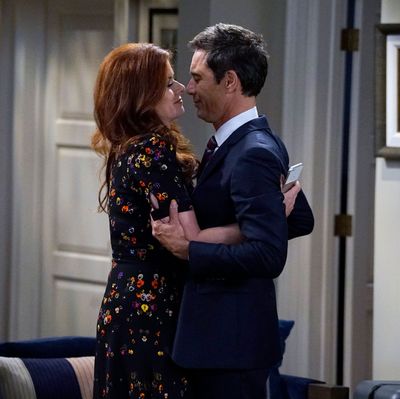
A truly satisfying TV reboot can either boldly take familiar characters into surprising, experimental territory (see: Twin Peaks: The Return) or it can say: Screw it. Let’s do what works and more or less pretend as if no time has passed.
Will & Grace, which originally ran on NBC for eight seasons from 1998 to 2006, sprints full barrel toward option B. That said, its ninth season premiere — airing Thursday at 9 on NBC, if you somehow missed the promotional train — doesn’t feel entirely familiar. That’s because the first episode of the the out-and-proud sitcom focuses heavily on Donald Trump, as Grace (Debra Messing) gets hired by the president to redecorate the Oval Office — Karen (Megan Mullally), a Trump supporter and friend of Melania (natch) recommended her for the job — and Will (Eric McCormack) goes to Washington to meet an anti-EPA Republican senator who also happens to be a hottie. Jack (Sean Hayes), of course, comes along for the Amtrak ride … and to hit on an old friend in the Secret Service.
It’s not surprising that Will & Grace would shoot right out of the gate with political material considering that’s what got us here in the first place. The idea to bring back the comedy about a gay man, his hetero best girlfriend, and their scene-stealing closest pals came out of a short get-out-the-vote video made by the Will & Grace crew during last year’s election. Now, a year later, Will & Grace is back on network television, Donald Trump is in the White House, and Grace Adler is dropping the term “fake news” into conversation.
One of the things that feels a little off about episode one — called, appropriately, “Eleven Years Later” — is the fact that the dialogue and plot lines have been contorted unnaturally to tap into the current political moment. Will & Grace was certainly progressive in that it was the first broadcast comedy aimed at a mainstream audience that, from the very beginning, depicted the lives of gay characters. The show was rarely overtly political, though. Sometimes its reliance on gay stereotypes and jokes at the expense of Karen’s El Salvadoran housekeeper Rosario were pretty regressive. While it makes sense that the current commander-in-chief would be on these characters’ minds, it’s more than a little forced and weird to see Karen holding up a curtain swatch in the Oval Office while Grace pairs it with a Cheeto. (“I need to make sure it works with his coloring,” she says wryly.)
What is not forced or weird at all, though, is the comedic chemistry between the four leads. Messing, McCormack, Hayes, and Mullally haven’t lost a single sassy step in their years out of each other’s orbits. Happily, episodes two and three revert to more traditional Will & Grace subject matter — dating issues, problems in the workplace, and fast-paced, often physical comedy — that gives them the opportunity to more effectively work their charms.
There’s an extended bit in episode two involving Karen, Grace, and a malfunctioning voice-activated shower that requires the two women to argue over whether or not Karen, who continues to sound like an angry baby doll on helium, deserves a raise while floating in the slowly filling equivalent of a human goldfish bowl. It’s the stuff of classic I Love Lucy–style comedy and both Messing and Mullally have an instinct for it that quite literally expands when immersed in water.
The men remain equally gifted. McCormack still consistently delivers his sarcastic bon mots with the dryness of a Saltine left out in the desert, while Hayes is still as endearingly frenetic and wicked in his retorts. “He doesn’t like Madonna,” Will says of the 20-something, played by Ben Platt of Dear Evan Hansen fame, that he’s attempting to date. “He should be beaten with a VHS copy of Evita,” Jack responds without even a millisecond of hesitation. Will & Grace is cleverly written and directed with crisp polish by veteran James Burrows, who has directed every single episode in the show’s entire run. But it wouldn’t be nearly as fun to watch without these four actors.
The new Will & Grace handles history in fascinating ways. As all the Trump talk suggests, the show makes a concerted effort to assert that it’s happening in 2017, with all the references to Grindr and Obamacare that entails. But watching it also is akin to jumping through a portal back to the year 2000: The stars haven’t changed, the campy humor hasn’t changed, even the twinkly, piano-based musical interludes haven’t changed. The opening scene in the first episode underlines that point by making it clear to the audience that just about everything that occurred in what was then deemed the series finale didn’t actually happen: Will and Grace did wind up with other partners but are now divorced. They also never grew apart or went on to have kids who would eventually wind up at the same college, as “The Finale” from 2006 implied.
“That tracks,” Karen says, with more than a twinge of irony, as all of this is quickly explained.
It doesn’t track at all, of course; if another series declared that major elements of its own finale suddenly weren’t canon, it would be a preposterous, disastrous move. But on Will & Grace, it doesn’t even matter. The appeal of this weekly semi-sexually fluid rom-com has nothing to do with what really happens in the lives of actual gay and straight New Yorkers. It was and is about spending time in this utterly silly, farcical corner of fantasy Manhattan, with these particular dysfunctional gay and straight people. Maybe we don’t need them to take on Trump, but right now, a lot of Americans may need the refreshing break from reality that Will, Grace, Jack, and Karen provide. It’s nice to have them with us again.





